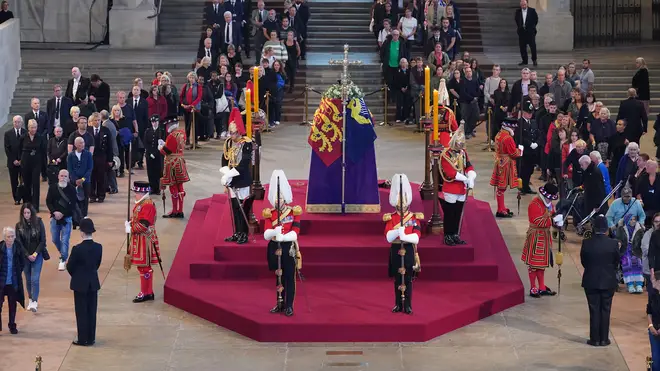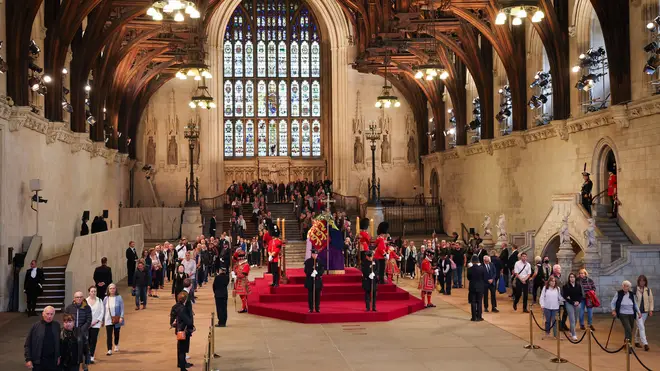
Ben Kentish 10pm - 1am
16 September 2022, 19:43 | Updated: 16 September 2022, 20:07

Surely, no other room has witnessed quite so much. Once, the high, arched, oak beams of Westminster Hall looked down upon coronation banquets: of Normans, Tudors, Stuarts; of Richard the Lionheart, Henry VIII, Elizabeth I.
The towering stone walls played host to the trials of Guy Fawkes and Thomas More, saw King Charles I sentenced to death, watched over the inauguration of Cromwell’s protectorate.
On these flagstones, Winston Churchill lay in state, Nelson Mandela reflected on the end of apartheid, Barack Obama insisted to MPs and peers that yes, they could. Here, Popes, presidents and other world leaders, now long dead, addressed the oldest of parliaments at pivotal moments in human history.
Now, today, the vaulted eaves gaze down upon two ragged lines of people, a purple platform, a coffin draped in the Royal Standard. On top has been placed a wreath and a crown. Around it, 10 guards, clad head to toe in gold and crimson regalia, stand rigid and motionless. The flames of four candles flicker at each corner.
This is the sight that thousands upon thousands have queued for hours to see. Outside, in the lines that snake their way down the Thames, there is a buzz. The mood is jovial, excitable, anticipatory. Friends have been made, stories and numbers exchanged, cold nights and sore feet endured. As they approach the Palace of Westminster, zig-zagging through Victoria Gardens, passing through a hastily-erected security tent, the volume grows.

Inside, though, there is silence - the only sound the muffled footsteps and the slow, steady clomp of the guards’ feet as they replace each other. The hall echoes with the sound of their boots, as it echoes with the sounds of centuries past. Every 20 minutes it happens, like clockwork: a sword is banged twice on the stone floor, the queue stops, 10 guards march slowly in, 10 march out. In between, the air is still. People move slowly. No one speaks. The hush is reverent, charged. The sense of occasion, of history, of emotion, of respect, makes them mute. Sound seems somehow unbefitting here; quiet reigns.
It takes those who have queued for hours barely a minute, maybe two, to walk the length of the Hall, to file past the coffin. Some do not break step, strolling casually through. Most pause, turning towards the platform to bow, or curtsey, or cross themselves, or dab their eyes. Others simply stop and stare, unsure of what to do with this briefest of moments, this fleeting audience with their Queen, that they have waited so long to attend.
What they all do is look back. Reaching the huge wooden doors at the end of Westminster Hall, they pause, glancing over their shoulders for one final look – at the platform, the coffin, the 70-year reign, the memories, taking in this moment, in this most historic of halls, that they will never experience again. Perhaps some, in their minds, see a 25-year-old taking to the throne, or a young woman arm-in-arm with a Duke; perhaps they remember the Christmas Day speeches, the addresses to the nation at times of joy and darkness, or the bright skirt suits, or the radiant smile. Perhaps they simply see the coffin, draped in purple and gold.
This is all they will have to remember. No phones are allowed here – the selfies and videos that record every other aspect of modern life are no use. The memories of the hundreds of thousands who pass through this Hall will be formed only from their eyes, their emotions.
They leave, and then the emotion comes. Tears flow. Friends and relatives hug each other tight. Strangers put their arms around each other. Husbands console wives, wives comfort husbands.

Chorus greets coffin of Queen Elizabeth II as it is brought into Westminster Hall
Who are these people? Who, really, are they not? Generalities are impossible. They are young and old, British, tourists, people of every colour and creed. The have come from near and far. Some have dressed up for the occasion, most have not. Some walk slowly with the help of sticks, others, barely old enough to walk at all, grip the hands of their parents. Lords, dignitaries, government ministers past and present join those paying their respects; many have brought their families and children to share this moment.
In the middle of this hall, on a spot now covered by the catafalque upon which the Queen’s coffin sits, two plaques are embedded in the ancient flagstone floor. One marks the spot where, 70 years ago, the body of her father, George VI, lay in state. The other is from 2002, when it was her mother’s turn to rest here. Now, it is hers.
Indeed, in this room, over the centuries, countless monarchs have dined, laughed, sat, spoken, hosted, lay in state. None have reigned as long as this one. None have drawn these crowds, or this emotion.
In the weeks and months to come, normality will return, life will resume, this great hall will once again be filled not with silent mourners but with striding ministers and ambling peers. The majestic splendour of the guards, the ornaments, the crown, will give way once again to drab blue and grey suits. The hush will be replaced by hubbub. A new plaque will no doubt be installed, and tourists will amble over the spot where people from across the globe flocked to pay tribute to Queen Elizabeth II one final time.
This age-old building will keep standing, more history will take place under its intricate beams. In time, more kings and queens will be carried through its great oak doors, their reigns also complete; future generations will queue to view their coffins. This may all be true but never will there be another moment quite like this. Why? Because, surely, there will never be another monarch quite like her.